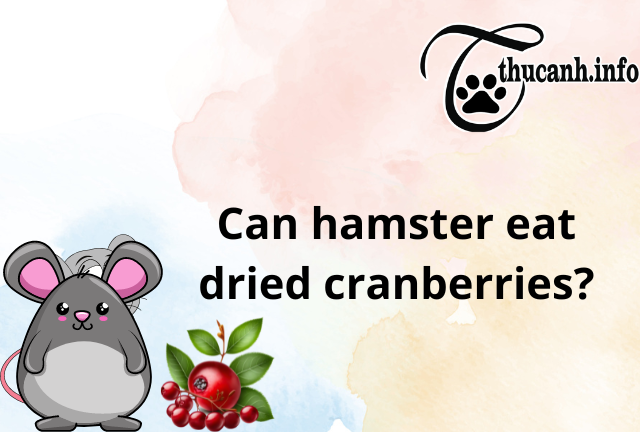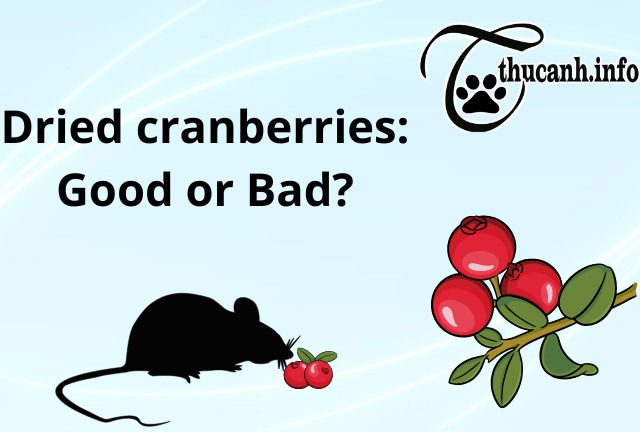Hamsters can eat dried cranberries, but it’s crucial to do so in moderation. The question “Can Hamsters Eat Dried Cranberries” often arises among hamster owners. Dried cranberries are rich in antioxidants and contain essential nutrients for digestive health. However, it’s important to be aware of the potential risks associated with their high sugar content. Feeding dried cranberries as an occasional treat and choosing unsweetened, organic varieties can help mitigate these risks.
If you have concerns about the suitability and quantity of dried cranberries for your hamster’s diet, consult with a veterinarian. Remember, a balanced diet that includes a variety of commercial hamster food, fresh fruits, vegetables, and occasional dried cranberries will contribute to your hamster’s overall well-being.

Before offering dried cranberries to your hamster
1, Nutritional Value of Dried Cranberries for Hamsters
1.1. Essential Nutrients in Dried Cranberries
Dried cranberries are packed with essential nutrients that can benefit hamsters when consumed in moderation. These tiny, dried fruits contain a variety of vitamins and minerals that contribute to a healthy diet for your furry friend.
One of the key nutrients found in dried cranberries is Vitamin C. This vitamin is crucial for hamsters as they cannot produce it naturally in their bodies. Vitamin C plays a vital role in boosting the immune system and promoting overall health. By including dried cranberries in your hamster’s diet, you can help ensure they receive an adequate amount of this important vitamin.
In addition to Vitamin C, dried cranberries also provide dietary fiber. Fiber is essential for maintaining a healthy digestive system in hamsters. It aids in regulating bowel movements and preventing issues such as constipation. Including dried cranberries in your hamster’s diet can help promote regular digestion and prevent digestive problems.
1.2. Role of Cranberries in Hamster Nutrition
Cranberries, whether fresh or dried, can play a beneficial role in hamster nutrition. While dried cranberries do contain a concentrated amount of natural sugars, when fed in moderation, they can offer several advantages for your pet’s well-being.
The antioxidants present in cranberries can provide protection against harmful free radicals in the hamster’s body. These antioxidants help reduce the risk of cell damage and support overall health. Including dried cranberries as part of your hamster’s diet can contribute to their overall antioxidant intake and promote a healthy immune system.
It’s important to note that dried cranberries should be given in small quantities as occasional treats, rather than as a staple food in your hamster’s diet. This is because the high sugar content in dried cranberries can lead to weight gain and potential health issues if overconsumed.
Always monitor your hamster’s diet and consult with a veterinarian to ensure you are providing a well-balanced and appropriate diet for your pet. They can provide specific recommendations based on your hamster’s individual needs and help you determine the appropriate amount of dried cranberries to include in their diet.
Remember, moderation is key when offering dried cranberries or any treats to your hamster. By providing a balanced and varied diet, you can ensure your furry friend receives the necessary nutrients while still enjoying the occasional dried cranberry as a tasty treat.
2. Benefits of Hamsters Eating Dried Cranberries
2.1. Antioxidant Properties of Dried Cranberries
Dried cranberries offer several benefits to hamsters when consumed in moderation. These fruits are rich in antioxidants, which help protect the body’s cells from damage caused by harmful free radicals. Including dried cranberries in a hamster’s diet can provide them with a natural source of antioxidants.
2.2. Promotion of Urinary Tract Health
Dried cranberries can also promote urinary tract health in hamsters. They contain compounds that help prevent urinary tract infections (UTIs) in hamsters. Regular consumption of dried cranberries may inhibit the growth of bacteria in the urinary tract, reducing the likelihood of UTIs and promoting a healthier urinary system.
2.3. Support for Digestive Health
In addition to urinary tract health, dried cranberries can support hamsters’ digestive health. They are a good source of dietary fiber, which aids in proper digestion and prevents constipation. Including dried cranberries in their diet can help maintain a healthy digestive system in hamsters.
2.4. Potential Cancer-Fighting Properties
Dried cranberries contain certain compounds that may have cancer-fighting properties. While more research is needed, these compounds, such as antioxidants and phytonutrients, have been studied for their potential to inhibit the growth of cancer cells and protect against cellular damage. Including dried cranberries in a hamster’s diet may provide some potential protection against cancer.
2.5. Boosting the Immune System
A strong immune system is crucial for hamsters’ overall health, and dried cranberries can contribute to immune system support. They are a natural source of vitamin C, which is known to boost immune function. By incorporating dried cranberries into their diet, hamsters may enhance their immune response and reduce the risk of infections and diseases.
In conclusion, dried cranberries can be a beneficial addition to a hamster’s diet, offering antioxidant properties, potential urinary tract health benefits, support for digestive health, potential cancer-fighting properties, and immune system boosting qualities. However, it’s important to feed dried cranberries in moderation and consult with a veterinarian for specific dietary recommendations for your hamster.
2. Potential Risks and Considerations
2.1. High Sugar Content in Dried Cranberries
Dried cranberries contain a high amount of natural sugars, which can be a concern when feeding them to hamsters. Excessive sugar consumption can lead to weight gain, obesity, and other health issues. It is important to keep in mind that hamsters have small stomachs and a limited ability to process sugars. Therefore, it is recommended to feed dried cranberries to hamsters in moderation and as a treat rather than a staple food in their diet.
2.2. Impact on Blood Sugar Levels
Due to the high sugar content in dried cranberries, their consumption can cause a rapid increase in blood sugar levels in hamsters. This sudden spike in blood sugar can be detrimental to their health, especially for hamsters that are prone to diabetes. It is crucial to monitor the amount of dried cranberries given to hamsters and ensure it is within a safe range to prevent any adverse effects on their blood sugar levels.
2.3. Digestive Upsets and Diarrhea
Another consideration when feeding dried cranberries to hamsters is the potential for digestive upsets and diarrhea. The high sugar and fiber content in dried cranberries can disrupt the delicate balance of the hamster’s digestive system, leading to gastrointestinal issues. It is important to introduce dried cranberries gradually into their diet and monitor their response. If a hamster experiences digestive upsets or diarrhea after consuming dried cranberries, it is best to discontinue feeding them this treat and consult a veterinarian if the symptoms persist.
It is essential to prioritize the overall health and well-being of hamsters when deciding to include dried cranberries in their diet. Monitoring their sugar intake, considering any existing health conditions, and observing their individual response to dried cranberries will help ensure a safe and balanced diet for your furry friend. Always consult with a veterinarian for specific dietary recommendations and guidance tailored to your hamster’s needs.
3. How to Safely Feed Dried Cranberries to Hamsters
3.1. Moderation and Portion Control
When it comes to feeding dried cranberries to your hamster, moderation is key. While they can enjoy the occasional treat, it’s important to remember that dried cranberries are high in sugar content. Too much sugar can lead to weight gain, dental issues, and even diabetes in hamsters. Therefore, it’s crucial to offer dried cranberries in small portions as part of a balanced diet.
3.2. Choosing Organic and Unsweetened Options
To ensure the safety and health of your hamster, it’s recommended to choose organic and unsweetened dried cranberries. Commercially available dried cranberries often contain added sugars, preservatives, and artificial flavorings, which can be harmful to your pet. Opting for organic varieties ensures that you’re providing a more natural and wholesome snack for your furry friend.
3.3. Proper Preparation and Washing
Before offering dried cranberries to your hamster, it’s essential to properly prepare and wash them. Start by checking the quality of the dried cranberries and make sure they are free from mold or any signs of spoilage. If necessary, you can soak them in water for a few minutes to soften them slightly, making them easier for your hamster to chew.
Next, give the dried cranberries a thorough rinse under running water to remove any dirt, dust, or potential contaminants. This step helps ensure that your hamster is not exposed to harmful substances.
Once the dried cranberries are clean and prepared, you can offer them to your hamster as a special treat. Remember to serve them in small quantities and monitor your hamster’s reaction. If you notice any signs of digestive upset or if your hamster refuses to eat them, it’s best to discontinue offering dried cranberries and consult with a veterinarian.
By practicing moderation, choosing organic and unsweetened options, and properly preparing dried cranberries, you can safely incorporate this treat into your hamster’s diet while prioritizing their well-being.
4. Alternatives to Dried Cranberries
4.1. Safe Fruits and Vegetables for Hamsters

Alternatives to Dried Cranberries
When it comes to providing a well-rounded diet for your hamster, it’s important to explore alternative options to dried cranberries. While cranberries can be a tasty treat for your furry friend, it’s always good to offer a variety of fruits and vegetables to ensure they receive a balanced nutritional intake.
- Apples: Hamsters can enjoy small pieces of fresh, organic apples as a delicious and healthy snack. Remember to remove the seeds and core before feeding them to your hamster.
- Bananas: This tropical fruit is a favorite among many hamsters. Offer small slices of ripe banana as an occasional treat. However, keep in mind that bananas are high in sugar, so moderation is key.
- Strawberries: These juicy and vibrant berries can be a delightful addition to your hamster’s diet. Provide small, washed strawberries as an occasional treat, removing the green tops beforehand.
- Blueberries: Packed with antioxidants, blueberries are a nutritious option for your hamster. Offer a few blueberries as a special treat, ensuring they are thoroughly washed.
4.2. Variety in Hamster Diet
While fruits are a great way to add variety to your hamster’s diet, it’s equally important to incorporate vegetables into their meals. Here are some safe vegetable options to consider:
- Carrots: Crunchy and full of vitamins, carrots make a healthy addition to your hamster’s diet. Offer small, finely grated pieces or thin carrot slices.
- Broccoli: This green vegetable is a good source of fiber and nutrients for hamsters. Chop small florets into manageable pieces for your pet.
- Peas: Frozen peas, thawed and slightly cooked, can be given to your hamster as a nutritious snack. They can be a fun and tasty way to add variety to their diet.
- Spinach: A leafy green that is rich in vitamins, spinach can be fed to hamsters in small amounts. Make sure to thoroughly wash the leaves and offer them sparingly.
Remember, the key is to introduce these alternative fruits and vegetables gradually and in moderation. This will ensure that your hamster enjoys a diverse diet while maintaining their overall health and well-being.
Always consult with a veterinarian to ensure you are providing the best diet for your hamster, as individual dietary needs may vary.
5. Conclusion
Can Hamsters Eat Dried Cranberries? A Comprehensive Guide
In conclusion, the question of whether hamsters can eat dried cranberries has been thoroughly explored. The answer is yes, hamsters can indeed enjoy dried cranberries as part of their diet. However, it is important to exercise caution and moderation when feeding them to your furry friends.
NGUỒN: THÚ CẢNH


